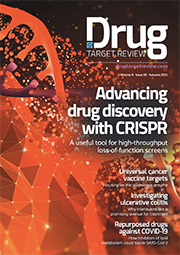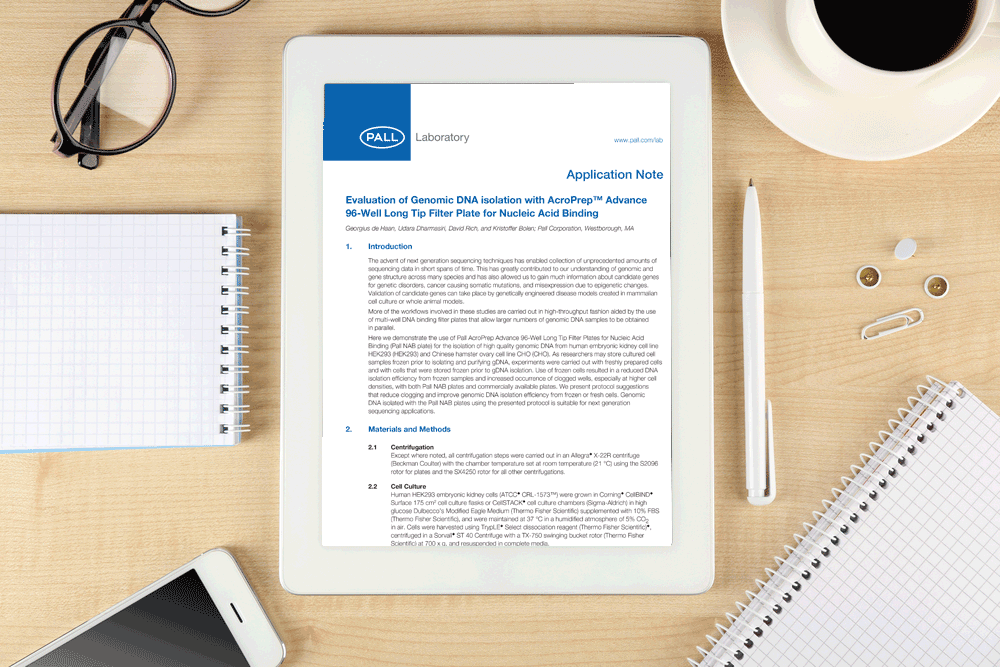App note: Evaluation of Genomic DNA isolation with AcroPrep™ Advance 96-Well Long Tip Filter Plate for Nucleic Acid Binding
Posted: 22 November 2016 | Pall Laboratory | No comments yet
In this application note, Pall demonstrate the use of Pall AcroPrep Advance 96-Well Long Tip Filter Plates for Nucleic Acid Binding…
The advent of next generation sequencing techniques has enabled collection of unprecedented amounts of sequencing data in short spans of time.
This has greatly contributed to our understanding of genomic and gene structure across many species and has also allowed us to gain much information about candidate genes for genetic disorders, cancer causing somatic mutations, and misexpression due to epigenetic changes. Validation of candidate genes can take place by genetically engineered disease models created in mammalian cell culture or whole animal models.
More of the workflows involved in these studies are carried out in high-throughput fashion aided by the use of multi-well DNA binding filter plates that allow larger numbers of genomic DNA samples to be obtained in parallel.
Here we demonstrate the use of Pall AcroPrep Advance 96-Well Long Tip Filter Plates for Nucleic Acid Binding (Pall NAB plate) for the isolation of high quality genomic DNA from human embryonic kidney cell line HEK293 (HEK293) and Chinese hamster ovary cell line CHO (CHO). As researchers may store cultured cell samples frozen prior to isolating and purifying gDNA, experiments were carried out with freshly prepared cells and with cells that were stored frozen prior to gDNA isolation. Use of frozen cells resulted in a reduced DNA isolation efficiency from frozen samples and increased occurrence of clogged wells, especially at higher cell densities, with both Pall NAB plates and commercially available plates. We present protocol suggestions that reduce clogging and improve genomic DNA isolation efficiency from frozen or fresh cells. Genomic DNA isolated with the Pall NAB plates using the presented protocol is suitable for next generation sequencing applications.
This application note is restricted - login or subscribe free to access


Why subscribe? Join our growing community of thousands of industry professionals and gain access to:
- quarterly issues in print and/or digital format
- case studies, whitepapers, webinars and industry-leading content
- breaking news and features
- our extensive online archive of thousands of articles and years of past issues
- ...And it's all free!
Click here to Subscribe today Login here
Related content from this organisation
- Pall Laboratory
- App note: Evaluation of RNA isolation efficiency of Pall AcroPrep™ Advance 96-Well Long Tip Filter Plate for Nucleic Acid Binding
- App note: AcroPrep™ Advance 96-well Long Tip Filter Plate for Nucleic Acid Binding for high-throughput purification of plasmid DNA
- App note: Evaluation of Genomic DNA isolation with AcroPrep™ Advance 96-Well Long Tip Filter Plate for Nucleic Acid Binding
- Whitepaper: Single-tube DNA purification and cloning using ultrafiltration devices
Related topics
Genomics
Related organisations
Pall Laboratory





